Blog (446 found)
Mining, Repression and Imprisonment, an Uncertain Future
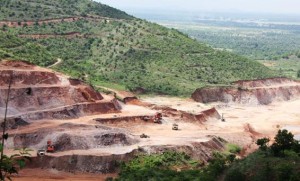 Burma has been internationally praised for moving in a more democratic direction recently. Sadly for many citizens these changes are a world away. Their interactions with the Burma government are characterized by the same repressive, corrupt, strong armed tactics that made Burma an international pariah for decades.
Burma has been internationally praised for moving in a more democratic direction recently. Sadly for many citizens these changes are a world away. Their interactions with the Burma government are characterized by the same repressive, corrupt, strong armed tactics that made Burma an international pariah for decades.
In the Letpadaung mountains, huge amounts of land have been forcibly confiscated by the government, environmental degradation has occurred and a policy of arrest and detention of peaceful protestors has been implemented. The Monywa Copper Project is located in central Burma’s Sagaing Division with four large deposits: Sabetaung, Sabetaung South, Kyisintaung and Letpadaung. The project covers almost 8,000 acres of land, the majority of which was forcibly taken from villagers.
Resource extraction has been the cause of some of Burma’s largest human rights violations and land confiscations. The Monywa Copper Project is the country’s largest mine in terms of recovery rates, production and revenue. Protests over the project and national attention have been growing, as have the number of arrests and detentions in association with those protests and land confiscation cases.
• • •President Thein Sein’s UN Speech Disguises the Truth Behind Burma’s Reforms
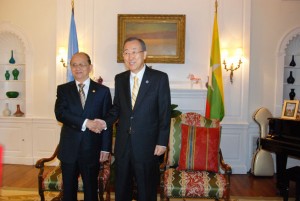 As President Thein Sein was busy at the UN General Assembly describing “the amazing changes” in Burma as “irreversible,” the Burma Army offensive in Kachin State continues unabated, hundreds of political prisoners remain incarcerated and peaceful protesters are detained and summoned to court. The reality of the changes in Burma is that they are merely tentative and minimal; substantive change is yet to occur.
As President Thein Sein was busy at the UN General Assembly describing “the amazing changes” in Burma as “irreversible,” the Burma Army offensive in Kachin State continues unabated, hundreds of political prisoners remain incarcerated and peaceful protesters are detained and summoned to court. The reality of the changes in Burma is that they are merely tentative and minimal; substantive change is yet to occur.
This reality is perhaps most keenly felt in Kachin State where more and more people are fleeing their homes as clashes continue. President Thein Sein addressed the Kachin issue by stating that the government’s Peace Negotiation Team and the Kachin Independence Army (KIA) are “working to further strengthen the confidence building measures.” Yet what confidence measures are these? Human rights violations are ongoing while more and more troops are being sent to the frontlines. The government is also blocking humanitarian aid. These are not confidence building measures. It is of no surprise that members of the Kachin community in the US staged protests at President Thein Sein’s visit and wrote an open letter to Thein Sein urging him to “stop the harassment, interrogation, and detention of innocent Kachin civilians by the local authorities.” […]
The Long Road to Ending Armed Conflict in Burma
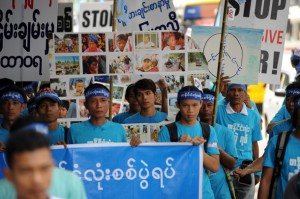 On 21 September, people around the world marked the United Nations’ International Day of Peace, a day that highlighted just how far there remains to go to achieve lasting peace in Burma.
On 21 September, people around the world marked the United Nations’ International Day of Peace, a day that highlighted just how far there remains to go to achieve lasting peace in Burma.
While Daw Aung San Suu Kyi was being feted on her first trip to the US in more than two decades, Kachin community members called on Daw Suu to do more for the people in Kachin State. As many as 90,000 people have been displaced due to armed conflict between the Burma Army and the Kachin Independence Army, and have little access to urgently needed humanitarian assistance.
Hundreds of protesters gathered in Rangoon on 21 September to call for peace in Burma, and especially in Kachin State. They wore blue headbands and carried signs reading “Stop Civil War” and “Justice Guarantees Lasting Peace” as they walked from City Hall to Inya Lake. Another group of protesters were stopped from traveling to Naypyidaw where they had planned to protest in front of the office of the Burma Army’s Commander-in-Chief; they instead joined the main group.
While authorities did not stop the main protest in Rangoon, the police later questioned 15 activists and have filed charges against them for violating Article 18 of the problematic Law Relating to Peaceful Assembly and Peaceful Procession for demonstrating without official permission. The activists say that they had applied for permission to protest and submitted all the necessary documents, but had been denied by authorities without being given any reason […]
Refugee Return Only with Consent, Safety and Dignity
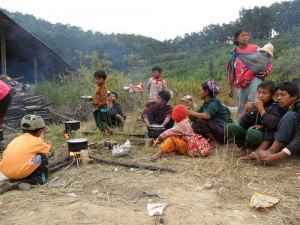 Anxiety and uncertainty has been building among refugees in Thailand’s camps regarding possible repatriation to Burma. While there are many actors who feel they have a major role in the decision-making of when and how this process will take place, none are more important than the refugees themselves. Thus, the release of a position paper by a group of Karen Community Based Organizations (KCBOs), many of whom work directly with communities inside Thailand’s refugee camps, is an important first step in making sure that it is those affected who determine the path that their lives will take.
Anxiety and uncertainty has been building among refugees in Thailand’s camps regarding possible repatriation to Burma. While there are many actors who feel they have a major role in the decision-making of when and how this process will take place, none are more important than the refugees themselves. Thus, the release of a position paper by a group of Karen Community Based Organizations (KCBOs), many of whom work directly with communities inside Thailand’s refugee camps, is an important first step in making sure that it is those affected who determine the path that their lives will take.
The position paper outlines pre-conditions for refugees’ return to Burma and the processes that must be followed once those preconditions have been met. The position paper is timely in that it was released the same week that the Thai National Security Council released a statement indicating that refugees will return within a year. Burma, the statement reads, “is clearing landmines along the borders, preparing to build shelters and other infrastructure… to be ready within one year.” […]
• • •Defending Human Rights Still a Risky Business in Burma
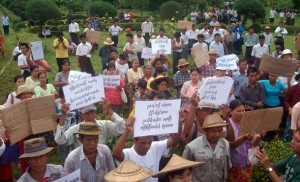 Last week former political prisoner Wai Lu, who was helping protesting farmers win back land confiscated by a copper mining company in the Latpadaung mountain range, was taken off a bus and arrested on his way back to Rangoon. Family members have been told he is being charged under Burma’s Religious Offenses Act, yet they haven’t had a chance to see him since his arrest and don’t know where he is being held.
Last week former political prisoner Wai Lu, who was helping protesting farmers win back land confiscated by a copper mining company in the Latpadaung mountain range, was taken off a bus and arrested on his way back to Rangoon. Family members have been told he is being charged under Burma’s Religious Offenses Act, yet they haven’t had a chance to see him since his arrest and don’t know where he is being held.
Wai Lu is not an isolated case. In the last two months, human rights defenders have been arbitrarily arrested for defending people’s freedom of assembly and for participating in protests. On 7 August, police in Mandalay detained labor activist Aye Thein after he represented vendors protesting against their relocation. In early July, the government harassed and detained student activists in order to prevent them from holding commemorations of the 50th anniversary of the military regime’s crackdown on students. In May, the Police arrested and intimidated more than 40 protesters who took part in the nationwide peaceful candlelight protest for electricity. Naw Ohn Hla, a former political prisoner, claims the authorities continue to spy on her since she led these protests […]
Burma: Come Home But Be Quiet
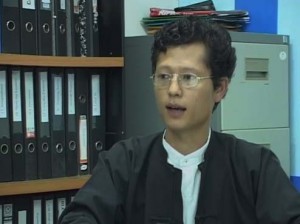 On Thursday, the office of President Thein Sein released the names of some 2,000 people who were removed from Burma’s infamous blacklist. For most of the people who discovered their names on the list it must have been an unprecedented moment, coming home was finally conceivable after years in exile. Yet looking at it more closely it appears that Thein Sein’s invitation to come home is also an invitation to remain quiet.
On Thursday, the office of President Thein Sein released the names of some 2,000 people who were removed from Burma’s infamous blacklist. For most of the people who discovered their names on the list it must have been an unprecedented moment, coming home was finally conceivable after years in exile. Yet looking at it more closely it appears that Thein Sein’s invitation to come home is also an invitation to remain quiet.
Little was said in the news about the more than 4,000 names remaining on the blacklist. Who are they? Why are they still on the list? When will they be removed? The only person who does know is President Thein Sein, thus ensuring that he still has the discretionary power to select who is and who is not allowed back home.
Welcoming exiles back to Burma and truly opening a space for free speech would mean consigning the entire concept of a blacklist to the history books. For Thein Sein’s invitation to be serious and genuine it must extend to everybody […]
Burma Ends Pre-Publication Check, Not Censorship
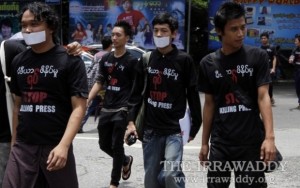 Prior submission of print media content that had been imposed for the last 48 years ended when the Press Scrutiny and Registration Board (PSRD) introduced its post-publication checks that came effective on 20 August. Journals and newspapers no longer need to submit their publication beforehand but afterward. However, the 1962 Printers and Publishers Registration Act and the 2004 Electronics Transaction Act that have been repeatedly used to jail journalists and activists are still in place. Journals have been suspended and could still be suspended at any time. Furthermore, journalists and reporters have to abide by the newly introduced 16-point ethical guidelines that prohibit them from criticizing the state.
Prior submission of print media content that had been imposed for the last 48 years ended when the Press Scrutiny and Registration Board (PSRD) introduced its post-publication checks that came effective on 20 August. Journals and newspapers no longer need to submit their publication beforehand but afterward. However, the 1962 Printers and Publishers Registration Act and the 2004 Electronics Transaction Act that have been repeatedly used to jail journalists and activists are still in place. Journals have been suspended and could still be suspended at any time. Furthermore, journalists and reporters have to abide by the newly introduced 16-point ethical guidelines that prohibit them from criticizing the state.
These repressive laws as well as the arbitrary regulations and code of conduct imposed on media and journalists remain a great threat to media freedom. The PSRD still monitors the content of publications and any newspaper or journal risks prosecution if any of their content breaks the guidelines. This has the very real potential of resulting in greater self-censorship […]
• • •Continued Conflict Overshadows Karen Martyrs Day
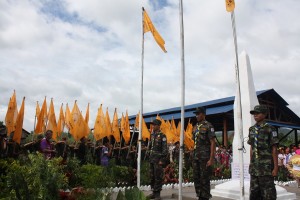 While Karen people around the world celebrated the 62nd Karen Martyrs Day last week to honour those who have died for the Karen cause, the fragility of the ceasefires with various groups remains tenuous as the Burma government continues to neglect the root causes of the conflicts. Denial and refusal to face up to human rights abuses while neglecting substantial political dialogue with the ethnic armed groups is not a sustainable solution to decades of conflict. Even during peace talks between the Government and the Karen National Union (KNU) in Myawaddy, eastern Karen State on August 7th, clashes between the government’s Border Guard Force and the Karen National Liberation Army (KNU’s armed wing) were occurring in other parts of the Karen region […]
While Karen people around the world celebrated the 62nd Karen Martyrs Day last week to honour those who have died for the Karen cause, the fragility of the ceasefires with various groups remains tenuous as the Burma government continues to neglect the root causes of the conflicts. Denial and refusal to face up to human rights abuses while neglecting substantial political dialogue with the ethnic armed groups is not a sustainable solution to decades of conflict. Even during peace talks between the Government and the Karen National Union (KNU) in Myawaddy, eastern Karen State on August 7th, clashes between the government’s Border Guard Force and the Karen National Liberation Army (KNU’s armed wing) were occurring in other parts of the Karen region […]
24 Years On: Still No Accountability
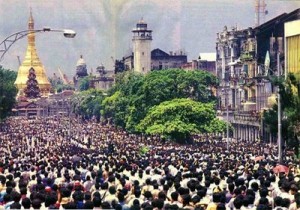 Across the country, on 8 August, commemorations were held to mark the 24th anniversary of mass protests when the people of Burma stood up to a repressive and violent regime in 1988. Sadly this was not the last mass protest to occur and the human rights violations and unjust imprisonment, which spurred the 8.8.88 demonstrations, continue today.
Across the country, on 8 August, commemorations were held to mark the 24th anniversary of mass protests when the people of Burma stood up to a repressive and violent regime in 1988. Sadly this was not the last mass protest to occur and the human rights violations and unjust imprisonment, which spurred the 8.8.88 demonstrations, continue today.
As a response to the demonetizations in 1985 and 1987 that wiped out the savings of families throughout the country, catastrophic mismanagement of the economy and military domination in national politics with ongoing human rights abuses, demonstrations began against the military government. Over the coming months there would be continued protests in all the major cities of Burma reaching a climax in August of that year. By the time the regime regained its control, over 3,000 unarmed citizens were killed and thousands more had been imprisoned and tortured.
The anniversary of 8.8.88 reminds us that the demands and frustration of 24 years ago are still present […]
UN Special Rapporteur Calls for Investigations, Accountability and Reconciliation in Burma
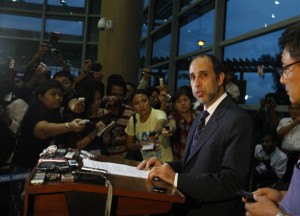 Last week, Tomás Ojea Quintana, the United Nations Special Rapporteur on human rights in Burma undertook his sixth visit to the country. His statement upon leaving Rangoon touched on many crucial issues, including the release of political prisoners, the situation in Arakan State and the need for a truth commission.
Last week, Tomás Ojea Quintana, the United Nations Special Rapporteur on human rights in Burma undertook his sixth visit to the country. His statement upon leaving Rangoon touched on many crucial issues, including the release of political prisoners, the situation in Arakan State and the need for a truth commission.
Quintana welcomed the release of Phyo Wai Aung, a young man falsely accused, tortured and imprisoned for his alleged involvement in bombings during the Thingyan water festival in 2010. While this was a welcome gesture from President Thein Sein, the Assistance Association for Political Prisoners reports that there are an estimated 448 political prisoners still behind bars. Each of these individuals must be released immediately, for as Quintana himself stated, “National reconciliation and democratic transition cannot move forward without this necessary step” […]









 All posts
All posts